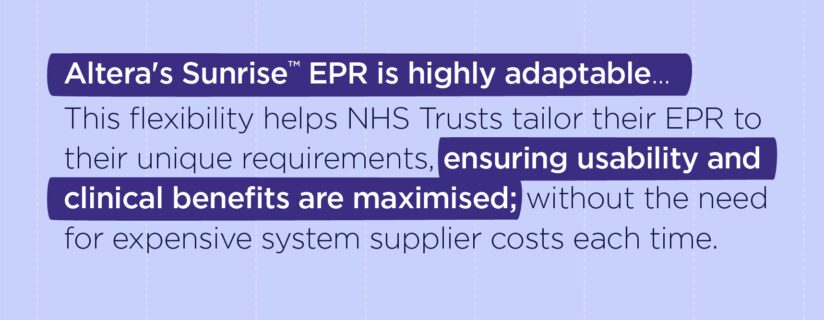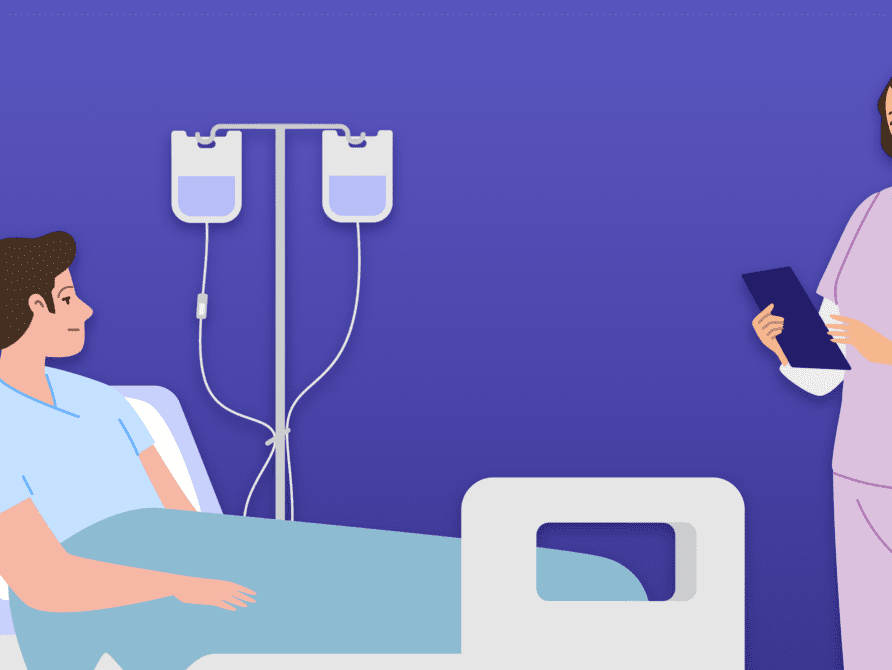Article
Empowering the NHS: How to procure an EPR using local budgets
The National Health Service (NHS) in the United Kingdom is one of the most cherished and respected institutions around the world. But it’s no secret that the system faces funding challenges. In this era of digital transformation, Electronic Patient Records (EPRs) are a crucial element in delivering efficient and high-quality care. However, procuring EPR systems can be an expensive and time-consuming endeavour. I’ve taken some time here to discuss how NHS trusts can strategically procure EPRs using local budgets without relying on national funding. I’ll also dive into Altera’s innovative approach, which offers the flexibility needed to sustain the NHS for decades to come.
The need for a more sustainable NHS
Creating a more sustainable NHS requires a shift in the way EPR systems are procured and implemented. Traditional approaches often involve hefty upfront costs, extensive national funding and lengthy implementation timelines. Such methods are not only financially burdensome but can also hinder innovation and flexibility. The NHS must find a way to balance the immediate need for digital transformation with long-term financial viability.
Modular and scalable EPR systems
One proven solution lies in the adoption of modular and scalable EPR systems. These systems are designed to be implemented in phases, enabling trusts to start small and then expand their digital capabilities. Unlike monolithic EPR systems that demand massive upfront investments, modular systems like Altera’s offer a more agile and cost-effective approach.
Altera’s flexible approach
Altera’s approach to EPR implementation aligns perfectly with the NHS’s sustainability goals. Our system is built on a modular architecture, enabling trusts to choose and implement only the components they need, significantly reducing initial costs. This modular approach means that NHS trusts can begin their digital transformation journeys without the need for substantial national funding.
Furthermore, Altera’s Sunrise™ EPR is highly adaptable, ensuring that it can evolve with changing clinical and administrative needs. This flexibility helps trusts tailor their EPR to their unique requirements, ensuring usability and clinical benefits are maximised; without the need for expensive system supplier costs each time.

Phased implementation
With Sunrise, NHS trusts can take a phased approach to implementation. They can start with core functionalities that address their most urgent needs. If they choose they can start with clinical functionality that improves the safety and reliability of patient care. They could then expand to other areas such as electronic prescribing and virtual wards as clinical groups across the organisation see the benefits it has delivered for their colleagues. This phased approach spreads costs out over time and also minimises disruption to healthcare services during the transition. Should they choose to do so, trusts can also elect to do PAS last. Changing a PAS can jeopardise a hospital’s ability to accurately report waiting times and submit national reports as well as affect how they get paid. Leaving this until later in the programme after first focussing on clinical benefits can greatly reduce the risks of national reporting challenges. Examples of how this phased approach to implementation can deliver high levels of digital maturity and clinical buy-in can be seen at Maidstone and Tunbridge Wells NHS Trust and Gloucestershire Hospitals NHS Trust, both of which took this approach.
Empowering NHS trusts
One of the key benefits of Altera’s approach is that it empowers NHS trusts to use their local budgets effectively rather than rely on national funding. Trusts can allocate funds based on their immediate priorities, ensuring that the most critical aspects of patient care are addressed first. This level of autonomy enables trusts to make strategic decisions about their digital transformation journeys without waiting for national funding approval.
Long-term viability
In addition to cost-effectiveness and flexibility, Altera’s approach ensures the long-term viability of EPR systems within NHS trusts. As technology evolves and healthcare needs change, Altera’s modular EPR system can easily adapt and integrate new features and functionalities. This adaptability is crucial for sustaining the NHS’s digital infrastructure without the need for frequent and costly system overhauls.
The path to a more sustainable NHS lies in innovative approaches to EPR implementation. By adopting modular and scalable EPR systems like Altera’s, NHS trusts can embark on their digital transformation journeys without relying on national funding. This phased approach not only reduces upfront costs but also ensures that the NHS remains adaptable to changing healthcare needs in the long run.
In embracing these approaches, the NHS can continue to provide world-class healthcare services to the nation. In a similar vein, I want to recommend recent Altera blog, Four reasons why you don’t need to take a big bang approach to EPR deployment by Dr Constantin Jabarin, CCIO, Altera Digital Health, which explores how successful phased approaches can be for trusts.
Learn more about how Altera is helping healthcare organisations across the globe.













